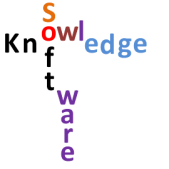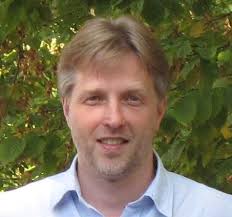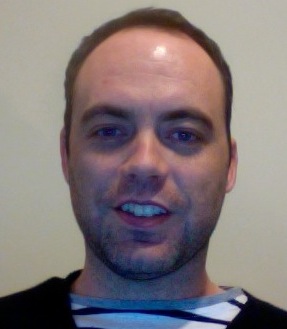Workshop
7th International Workshop on Software Knowledge -
SKY
2016
9 - 10 November, 2016 - Porto, Portugal
In conjunction with the 8th International Joint Conference on Knowledge Discovery, Knowledge Engineering and Knowledge Management - IC3K 2016
CO-CHAIRS

|
Iaakov Exman
School of Computer Science, HIT = Holon Institute of Technology
Israel
|
|
|
|
Brief Bio
Prof. Iaakov Exman, has a PhD in Physical Chemistry from the Hebrew University of Jerusalem, Israel, and has done post-doctoral research at Stanford University, California, USA, in the area of Artificial Intelligence-based discovery of potentially novel medication structures for the pharmaceutical industries. Back in Israel, he had ten years of experience at the Aerospace Industries and has founded and worked in parallel computing software start-ups. Currently he is a professor of Software Engineering at the School of Computer Science of the Holon Institute of Technology. His research interests and publications are centered on Theory of Software based upon linear algebraic methods and more recently on Quantum Software Theory equally applicable to quantum, classical and hybrid software systems. He is a coeditor of the book “Quantum Software – Aspects of Theory and System Design” (2024) published by Springer.
|

|
Juan Llorens
Carlos III of Madrid University
Spain
|
|
|
|
Brief Bio
Juan Llorens is Professor at the Informatics Department of the Carlos III University of Madrid - Spain. He received his MS degree in Industrial Engineer from the ICAI Polytechnic School at the UPC University in Madrid in 1986, Spain, and his PhD in Industrial Engineering and robotics at the Carlos III University of Madrid, Spain in 1996.
Dr. Llorens is the leader of the KR Group (Knowledge Reuse Group) within the University. In 1998 he was invited to the Högskolan på Åland (HÅ) (Åland, Finland). From 1998 to 2008 he split his educational activities between Madrid's University and the HÅ, where he taught different Software Engineering subjects.
His CV is presented in:
.LinkedIn
.Research Gate
|

|
Anabel Fraga
Carlos III of Madrid University
Spain
|
|
|
|
Brief Bio
Dr. Anabel Fraga is a Computer Engineering professional. Previous to set aside in the academic work, she committed her efforts in the industry as UNIX/Windows Administrator, Application Administrator for Telecom companies, Project Management and Consultancy. She obtained in 2004 her E-commerce and Networking Msc. in the Carlos III University of Madrid and in 2010 her PhD degree in Computer Science in the same university at the Knowledge Reuse Research Group. Her central areas of research are: Software Architecture, Information Engineering, Knowledge Management, Requirement Engineering, Systems Engineering, ITIL/ISO20000 and Reuse; but she is also interested in Ethics, Innovative methods of learning for supporting new software architects and the improvement of the CS Curriculum. She is Visiting Professor of Software/Systems engineering, Information/Knowledge Engineering and Programming in Carlos III University of Madrid. She is member of ACM CSTA, INCOSE, AEIS and IASA, and she is one of the leaders of the IASA Chapter of Madrid.
|
SKY CHALLENGE COMMITTEE - CHAIR
 |
Jose M. Alvarez
Carlos III of Madrid University (Spain)
Spain
|
|
|
|
Brief Bio
Dr. Jose María Alvarez Rodríguez a holds a PhD about eProcurement, formal
semantics and Linked Data (2012) by the University of Oviedo, Spain. He has more than 10 years of experience working in the R&D&i areas of public and
private institutions. He has also participated in more than 18 research projects in different competitive programmes. He is the author of more than
50 publications and other research works in the main international venues and impact factor journals. He is also member of international groups such
as the OSLC Requirements Management (RM) group and INCOSE (International Council of Systems Engineering).
|
News!
- SKY2016 will have two days with exciting contents. The first day will consist of the standard workshop sessions with contributed papers. The second day will consist of an “Intensive Software Knowledge School” with invited lecturers, appropriate for researchers and for engineers looking for a field overview or to deepen the understanding of Software Knowledge techniques and their potential. The “Intensive School” will include a hands-on practice session. SKY’2016 Intensive School theme: “Software Infrastructure for Software Knowledge”. The SKY’2016 Intensive School lectures will be held on 10/November/2016.
- SKY2016 will offer the SKY2016 Challenge in a new format to be announced soon.
Scope
"Software Knowledge" – in short SKY – means that software in its higher abstraction levels is a new kind of knowledge, Runnable knowledge as an end goal.
Thus, the classes and relationships of a software system design are easily viewed as classes and relationships in a knowledge ontology.
For further details visit SoftwareKnowledge.org.
The main theme of the SKY2016 Workshop is Software Knowledge within Systems Engineering Processes.
The exponential growth and availability of information and assets, both structured and unstructured is a critical challenge for Systems Engineering Processes.
Requirements engineering and Quality of Requirements are central areas for the workshop in the theme selected for this year.
Obtaining the right-requirements-right is a complex, difficult and non-linear process, in which engineers must respond to the double challenge of discovering and formalizing customers’ needs and expectations. The different ways of understanding and representing requirements, among customers and engineers, are real difficult problems at the time of clearly formalizing requirements.
The combination of Requirements Engineering with Software Knowledge, by information retrieval from existing sources (e.g. business rules, requirements, use cases, tests, feed-back), allows the verification process to measure quality of a set of requirements in various dimensions: traceability, consistency/redundancy, completeness and noise.
The Workshop main objective is to discuss and propose practical research approaches, theories and tools to deal with experimental and laboratory research, as well as with large scale industrial systems.
|
 |
Topics of Interest
Software Knowledge is a
runnable expression of meaning.
Running facilitates understanding in a very general sense. This is the rationale for the debugging process in a micro scale, where
one runs and breaks at desired points to understand the reason of software failures. This is the
basis of agile methods to manufacture and test concurrently, in a medium scale. This is the
possible source of great new tools, in a macro scale, from the software hierarchy
highest abstraction levels down to executable code.
SKY2016 topics of relevance include but are not limited to (Position and Regular papers):
Software-Knowledge Systems Engineering: Industrial problems, Tools, Operations and Methods
- Systems Engineering Problems under the Software-Knowledge view
- Dealing with huge amounts of Knowledge
- Big Data Analytics
- Big Data Visualization
- Dealing with diverse kinds of assets
- Natural Language Processing in Industry
- Systems Engineering in the Cloud
- Abstract Operations for Industrial Applications
- Analysis of System Engineering Process and adapting theory to practice
- Measurements of Quality of Requirements by automatic or semiautomatic processes and methods
Software-Knowledge Science Essentials
- Ontologies in complex systems
- Ontologies for Software Requirements verification
- Ontology-assisted system engineering processes
- Semantics above and beyond design patterns
- Runnable and testable knowledge representations
- Software-Knowledge representation and modeling
- Web dynamics and interestingness
- Software-Knowledge Requirements for Large Scale Systems
- Software-Knowledge selectivity and traceability
- Software-Knowledge Sharing: Meta-models and interchange formats
- Knowledge Driven Architecture and Engineering
- Characterization of Requirements Quality
Expected Outcomes
Expected outcomes of the SKY2016 Workshop are:
⇒ Proposals of new tools, techniques, methods and methodologies for large-scale Software-Knowledge Systems Engineering Processes, in basic research and in industry.
⇒ A continuing effort to standardize a Software-Knowledge representation consisting of software models encompassing semantics as first class objects.
IMPORTANT DATES
Paper Submission:
September 20, 2016 (expired)
Authors Notification:
September 26, 2016 (expired)
Camera Ready and Registration:
October 6, 2016 (expired)
Full day Workshop:
November 09, 2016
Intensive School Day:
November 10, 2016
Program Committee
Jose M. Alvarez,
UC3M, Spain
Shlomi Dolev,
Ben-Gurion University, Israel
Iaakov Exman,
JCE-Azrieli, Israel
Yishai Feldman,
IBM Research Lab, Israel
Anabel Fraga,
UC3M, Spain
Reuven Gallant,
JCT, Israel
Gonzalo Genova,
UCRM, Spain
Paulo Gomes,
Coimbra, Portugal
Juan Llorens,
UC3M, Spain
Hugo Goncalo Oliveira,
Coimbra University, Portugal
Gil Regev,
EPFL, Lausanne, Switzerland
David Rine,
George Mason University, USA
Edna Ruckhaus,
UC3M, Spain
Michal Smialek,
Warsaw University of Technology, Poland
Daniel Speicher,
University of Bonn, Germany
Reuven Yagel,
JCE-Azrieli, Israel
Advisory Committee
To be announced soon.
Invited Speakers

|
Daniel Speicher
University of Bonn
Germany
|
|
|
|
Brief Bio
Daniel Speicher is a Mathematician associated with the Research Group "Artificial Intelligence Foundations" of Emeritus Prof. A. B. Cremers at the B-IT at the University of Bonn. His main research interest lies in Software Science, more specifically in the area of code quality and how the consideration of developer ideas is essential for code quality evaluation. He contributed to the project "Analyzing and Striking the Sensitivities of Embryonal Tumors (ASSET)" of the European Union and the project "Context Sensitive Intelligence (CSI)" of the Deutsche Telekom Laboratories. As member of the research groups "Research on Object-Oriented Technologies and Systems (ROOTS)" and "Software Architecture and Middleware (SAM)" he contributed to a variety of software engineering lectures and seminars. Together with his colleagues he designed and conducted a very successful series of student labs in "Agile Software Development" in the context of the "International Program of Excellence (IPEC)" at the B-IT in Bonn and Nanjing.
|
|
Concept Lattices as a Versatile Tool to Discover Knowledge in Software
(on 9/November/2016)
|
Abstract
Concept Lattices in the sense of Formal Concept Analysis have been used in many different areas of Software Engineering, but most prominently in Reverse Engineering in an attempt to rediscover concepts of different kinds from existing systems. Once we extract a meaningful binary relation from a system we have a rich and pragmatic theory at hand to explore the inner structure of this relation. Interesting relations range from compile-time or run-time dependencies over direct or indirect usage relations to co-occurrence of terms in identifiers and message invocations. More advanced relations take a few program elements simultaneously into account. Formal Concept Analysis offers us then a unifying perspective to explore concepts as clusters or classes, to explore implications or associations rules as implementation regularities, where the regularities might be useful implementation idioms while the outliers might be refactoring opportunities. Finally Attribute Exploration gives us a tool to review whether the implications found in the system under consideration are generic.
|

|
Pedro Martins
University of Coimbra
Portugal
|
|
|
|
Brief Bio
Pedro Martins holds a PhD degree in Computer Science, an MSc degree in Informatics and Systems, and a BSc degree in Mathematics, with a major in Computer Science, from the University of Coimbra. His main research interests are in the fields of Computational Creativity, Computer Vision, Computer Graphics, and Computational Art.
He has participated in several research projects (both international and national) in his different areas of interest. He is also referee of international journals in the fields of Image Processing, Computer Vision, and Multimedia, such as IEEE Transactions on Image Processing or Journal of Visual Communication and Visual Representation.
Currently, he is a researcher at the Centre for Informatics and Systems of the University of Coimbra (CISUC) and an Invited Assistant Professor at the Department of Informatics Engineering of the University of Coimbra, where he usually teaches subjects in the area of Computer Graphics.
|
|
Some blends are better than others: Blend quality assessment in computational models of concept blending.
(on 9/November/2016)
|
Abstract
Concept blending (CB) is a cognitive mechanism by which two or more mental spaces are integrated to produce new concepts. The theory built around CB provides not only a set of sound principles but also a consistent terminology that can be used in creativity modeling. This has has been a major motivation to design artificial creative systems based on computational approaches to CB. In this talk, I will overview some computational models of CB theory and present the current challenges in the design of such models. A special emphasis will be given to our research on the quality assessment of blends, including a recent study on the relevance of the optimality principles.
|
|
INTENSIVE SCHOOL
|
|
SKY’2016 Intensive School theme: “Software Infrastructure for Software Knowledge”.
The SKY’2016 Intensive School lectures will be held on 10/November/2016.
|
|
Speaker: Daniel Speicher
|
|
Mining Source Code Regularities with FCA and Association Rules
(on 10/November/2016)
|
Abstract
Software encodes knowledge about the application domain as well as about the solution domain, i.e. about the used technologies and how they are combined. The correct implementation at this level is very often characterized by regularities, which are seldom expressed explicitly. Therefore it is useful to identify these regularities automatically. To name two obvious examples: "95% of the classes that implement equals() implement as well hash Code()" or "80% of the methods that open a transaction close it as well". The deviations from these rules are at least worth a review if not implementation errors. Formal Concept
Analysis offers a formal framework to mine Association Rules automatically and Concept Lattices are helpful in gaining an intuitive understanding.
|
PAPER SUBMISSION
Prospective authors are invited to submit papers in any of the topics listed above.
Instructions for preparing the manuscript (in Word and Latex formats) are available at: Paper Templates
Please also check the Guidelines.
Papers must be submitted electronically via the web-based submission system using the appropriated button on this page.
Publication
All accepted papers, including position papers, will be published in the workshop proceedings book and on CD-ROM support, under an ISBN reference.
All papers presented at the conference venue will be available at the SciTePress Digital Library (
http://www.scitepress.org/DigitalLibrary/).
SciTePress is member of CrossRef (
http://www.crossref.org/).
Previous Editions
For information on previous SKY Workshops please visit the
SoftwareKnowledge.org web site.